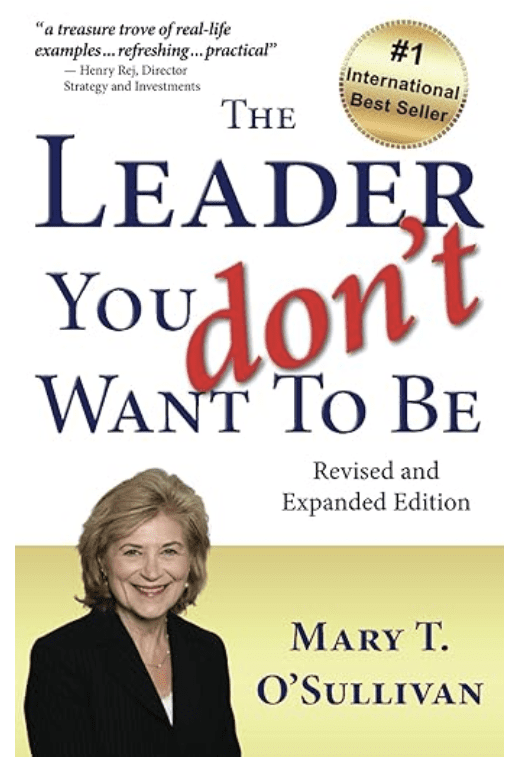Search Posts
Recent Posts
- Real Estate in RI: Seaside waterfront communities are all the rage. Who’s buying – Emilio DiSpirito June 6, 2025
- Outdoors in RI: 2A votes, Charter Yachts, active summer programs, garden tours, aquatic weeds… June 6, 2025
- All About Home Care, with two Rhode Island locations, closing after 22 years in business June 6, 2025
- GriefSPEAK: Angel wings with footprints – Mari Nardolillo Dias June 6, 2025
- Rhode Island Weather for June 6, 2025 – Jack Donnelly June 6, 2025
Categories
Subscribe!
Thanks for subscribing! Please check your email for further instructions.

Use Emotional Intelligence to grow your leadership style – Mary T. O’Sullivan
By Mary. T. O’Sullivan, MSOL, contributing writer on business leadership
“One in three businesses fail due to poor leadership while highly engaged leaders achieve 147% higher earnings per share, highlighting the vital role of effective leadership in business success.” – Forbes
Your department has exceeded its goals for the quarter. You’ve hired and promoted women and underserved community members. You think you’ve done all the right things to get ahead, but that next step still eludes you. What could be wrong? You notice a colleague brings the boss coffee on occasion, and never misses a company social gathering, but you think you’re too busy for that. However, when promotion and raise time comes around, you’re still busy, with your head down, working on your goals, and your colleague is moving up.
If you’re a driven person with career ambitions in mind, you may be missing a key element on your road to success. It’s not so much about the work you do, according to multiple sources, the missing link may be your lack of emotional intelligence. How you behave, and the emotions you display in the workplaces carry just as much or more weight in career success than any other trait. According to Forbes optimism, an emotional intelligence trait, is a solid predictor of career success. For instance, in one study, salespeople with a positive attitude toward their work outsold their pessimistic peers by 37% in the first two years on the job.
Are you the type that hides in your office all day, including eating lunch at your desk? Being introverted is a good trait for people who are happy to stay where they are, however, the more engagement you can muster, the better your chances of elevating your status. In fact, according to USA Today, extraverts earn up to $10,000 more per year than introverts. Moreover, The Motley Fool, a financial services company, quotes the pay difference between introverts and extroverts at $12,500 as indicated in their analysis.
Among other traits that stymy careers is wasting your time on mundane tasks that can easily be outsourced. Up to 70% of a leader’s time can be hijacked by routine administrative tasks. Again, the head down, work 80 hours per week attitude, doesn’t really get you anything better than more work, because you are so good at it. How can you learn to prioritize and make better decisions? Prioritization and delegation can be most difficult to achieve, especially if you’re a perfectionist. Why? Because we derive so much of our self-esteem from getting stuff done. The result is being buried in stacks of paperwork or mesmerized by your three competing computer monitors, vying for your attention all at the same time. And while you’re huddled away with your work, what is happening to develop your interpersonal skills?
Using emotional intelligence means taking care of you and your personal life as well. A 2016 Forbes article points out what we should all know by now: that working 24/7 and putting your life on hold suffocates success, as well as endangers physical and mental health. Effective leaders know that unplugging for a few hours or even an entire weekend is best for them. Disconnecting from the world speaks to the ability to handle stress management with the added benefit of enhancing a healthy lifestyle.
Micromanaging is yet another trap leaders fall into, thinking that only you can do the job best. You hired talented, qualified employees; by micromanaging them, you stifle their creativity and confidence in their work. Micromanaging also diminishes autonomy, one of the key factors most important to employees in the post pandemic workplace. Are you deluding yourself by standing over your employees’ shoulders, or are you able to test the reality of what is actually happening, and help solve the problem, not become part of it?
Without the benefits of leveraging the art of emotional intelligence, your career most likely will stall on the runway or worse, crash and burn. Understand your strengths and weaknesses and your blind spots. See things objectively. Develop some empathy. Using your emotional intelligence is the way to help employees feel valued and appreciated. They’ll be happier, and happy employees are more productive, improving your bottom line. Fortunately, you can improve your EI skills by taking heed from the experts. Slow down your reactions. Know when to offer and ask for help. Learn to understand nonverbal communication; just because someone says they will complete a task doesn’t mean they are happy about it, or even understand it. You can take an Emotional Quotient test, (EQi-2.0). Your assessor will review the results with you and offer a development plan. The best outcome is that you understand yourself and the people around you, lessening the work stress on everyone in the workplace.
“Employers are considering the importance of emotional intelligence in the workplace because it can be a crucial indicator of a prospective employee’s capabilities, including how well they would function as part of the company’s culture.” – University of Southern California (USC)
___

Connect with Mary:
www.encoreexecutivecoaching.com
https://www.linkedin.com/in/marytosullivan
Read all Mary’s columns here: https://rinewstoday.com/mary-t-osullivan-msol-pcc-shrm-scp/
.

Mary T. O’Sullivan, Master of Science, Organizational Leadership, International Coaching Federation Professional Certified Coach, Society of Human Resource Management, “Senior Certified Professional. Graduate Certificate in Executive and Professional Career Coaching, University of Texas at Dallas.
Member, Beta Gamma Sigma, the International Honor Society.
Advanced Studies in Education from Montclair University, SUNY Oswego and Syracuse University.
Mary is also a certified Six Sigma Specialist, Contract Specialist, IPT Leader and holds a Certificate in Essentials of Human Resource Management from SHRM.
